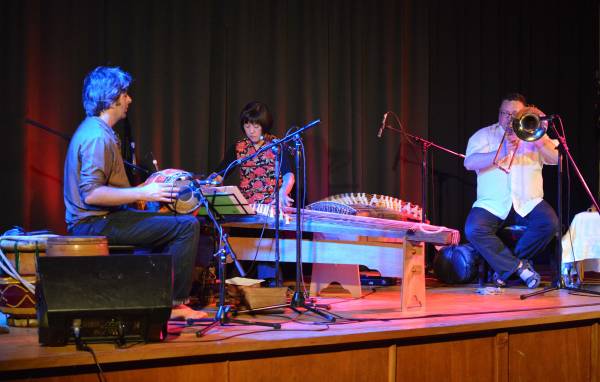Springwood Presbyterian Hall, October 3

It happens in all art forms, from the ostensibly dubiously-cast actor who ends up stealing the show to the feted children’s author who suddenly turns to soft-core erotica. Improbability especially thrives in music, where massed kazoos can play Led Zeppelin songs or Prrim’s instrumentation can consist of bass trombone, koto and percussion.
As bizarre as it looks, in the flesh it sounded entirely natural; almost inevitable. That is partly thanks to Adrian Sherriff, Satsuki Odamura and Tunji Beier being at the top of their respective games, partly to Sherriff and Beier’s multi-instrumentalism and partly to the grasp of South Indian (Carnatic) music.
Carnatic music’s rhythmic language underpins many of Sherriff’s compositions, even if the textures – reaching form the Caspian Sea to the Sea of Japan – are often exotic in an entirely incongruous way.
Among the highlights Autumn Rain opened with a solo koto improvisation that was so stark it was almost confronting, like an inner voice murmuring existential angst in one’s ear. Eventually it was joined by its Japanese bedfellow, the shakuhachi, although rather than opting for an ethereal sound Sherriff brought a more breathy, human and expressive one to bear, with Beier playing the zarb, a goblet-shaped drum of Persian extraction.
If this drum felt mismatched on Autumn Rain it came into its own on Wuru Wuru, which began with a solo trombone improvisation that showed Sherriff’s singular ability to milk the instrument’s seldom-heard demure side, before he explored its extreme lower register. Thereafter the bass koto and zarb joined over a very slow pulse, with Odamura making her instrument growl one moment and then arch up dramatically against Beier’s sparse groove and the trombone’s drones. Beier created a zarb solo of great subtlety and deftness, the rhythmic and dynamic ingenuity matched by the melodic content, and this, in turn, sparked an enthralling zarb/trombone duet.
Elsewhere Sherriff extended the group’s textures with two Sumatran wind instruments, the minute sarunai and the sweeter bansi, complemented by Beier’s Indian percussion.